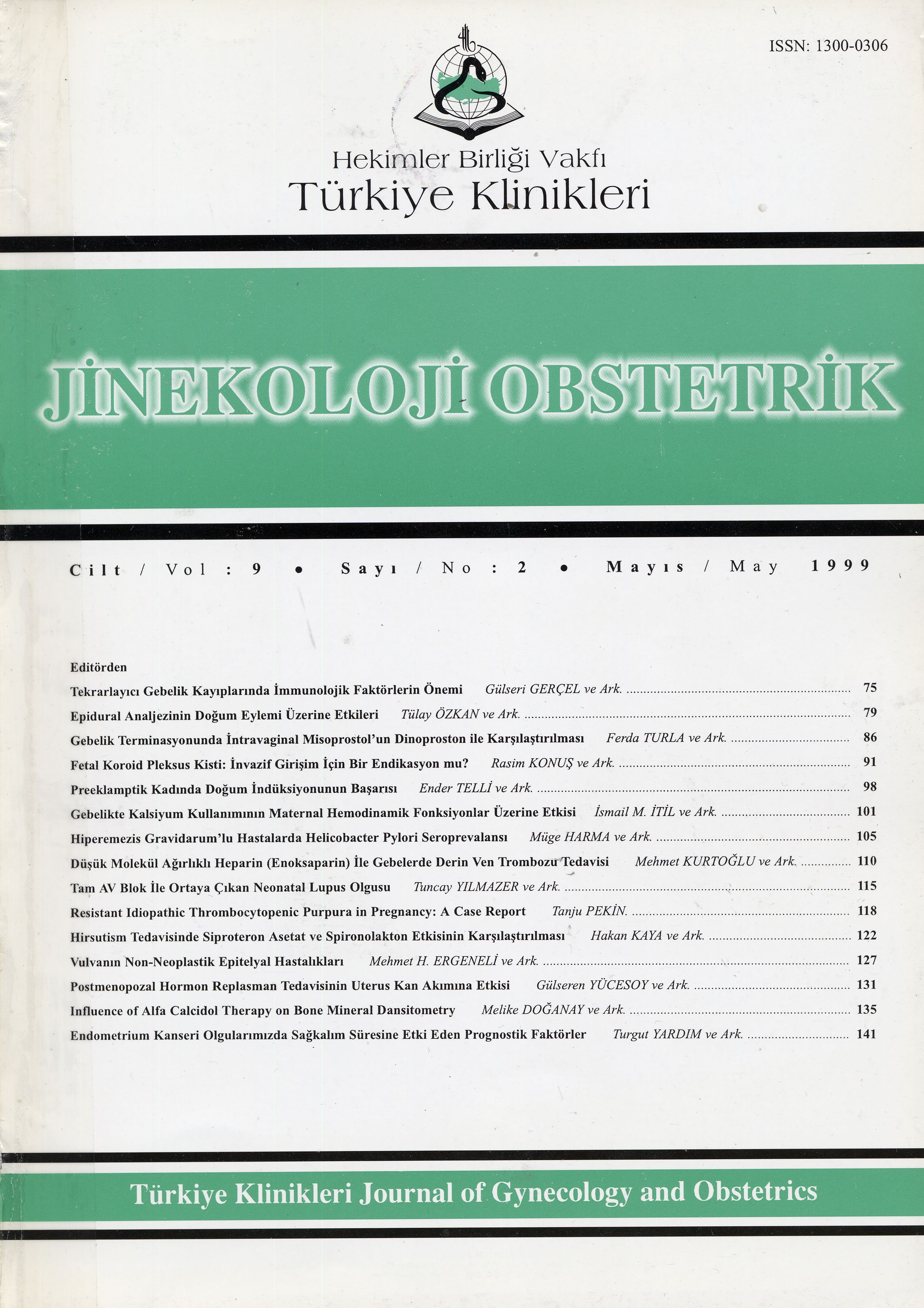Open Access
Peer Reviewed
ARTICLES
3913 Viewed1861 Downloaded
Treatment Of Pregnant Patients With Deep Venous Thrombosiswith Low Molecular Weight Heparin (Enoxaparin)
Düşük Molekül Ağırlıklı Heparin (Enoksaparin) İle Gebelerde Derin Ven Trombozu Tedavisi
Turkiye Klinikleri J Gynecol Obst. 1999;9(2):110-4
Article Language: TR
Copyright Ⓒ 2025 by Türkiye Klinikleri. This is an open access article under the CC BY-NC-ND license (http://creativecommons.org/licenses/by-nc-nd/4.0/)
ÖZET
Amaç: Derin ven trombozlu gebelerde düşük molekül ağırlıklı heparin uygulamasını irdelemek. Çalışmanın Yapıldığı Yer: İ.Ü. İstanbul Tıp Fakültesi Acil Cerrahi Anabilim Dalında Ocak 1996 - Mayıs 1998 tarihleri arasında 6 gebe derin ven trombozu tanısıyla takip ve tedavi edildi. Materyel ve Metod: Hastalar düşük molekül ağırlıklı heparin (Enoxaparin) ile tedavi edildiler. Tedavi gebelik süresince ve gebelik sonlandıktan sonra 10 gün daha devam ettirildi. Bulgular: Hiçbir hastada tromboemboli rekürrensi görülmedi. Üç gebede derin ven trombozu (DVT) ile beraber düşük tehdidi de mevcuttu. Bunlardan birisi tedavinin 31inci gününde, gebeliğin 15inci haftasında düşük yaptı. Diğerlerinin takibine devam edildi. Gebelik boyunca tedavi esnasında kanama görülmedi. Doğum sırasında (2 hasta) ve sezeryan ameliyatı esnasında (1 hasta) kanama diyatezi saptanmadı. Hastalarda uzun süreli düşük molekül ağırlıklı heparin (DMAH) kullanımına bağlı osteoporozu düşündürecek kemik ağrısı veya omurga ağrısı gibi yakınmalar olmadı. Doğum sonrası bebeklerin hiçbirinde anomali veya intraventriküler kanama tespit edilmedi. Sonuç: Derin ven trombozlu gebelerin gebelik boyunca, doğum esnasında ve doğum sonrasında tedavisi için, DMAH hem anne ve hem de bebek yönünden güvenle kullanılabilir ve etkin bir yöntemdir.
Amaç: Derin ven trombozlu gebelerde düşük molekül ağırlıklı heparin uygulamasını irdelemek. Çalışmanın Yapıldığı Yer: İ.Ü. İstanbul Tıp Fakültesi Acil Cerrahi Anabilim Dalında Ocak 1996 - Mayıs 1998 tarihleri arasında 6 gebe derin ven trombozu tanısıyla takip ve tedavi edildi. Materyel ve Metod: Hastalar düşük molekül ağırlıklı heparin (Enoxaparin) ile tedavi edildiler. Tedavi gebelik süresince ve gebelik sonlandıktan sonra 10 gün daha devam ettirildi. Bulgular: Hiçbir hastada tromboemboli rekürrensi görülmedi. Üç gebede derin ven trombozu (DVT) ile beraber düşük tehdidi de mevcuttu. Bunlardan birisi tedavinin 31inci gününde, gebeliğin 15inci haftasında düşük yaptı. Diğerlerinin takibine devam edildi. Gebelik boyunca tedavi esnasında kanama görülmedi. Doğum sırasında (2 hasta) ve sezeryan ameliyatı esnasında (1 hasta) kanama diyatezi saptanmadı. Hastalarda uzun süreli düşük molekül ağırlıklı heparin (DMAH) kullanımına bağlı osteoporozu düşündürecek kemik ağrısı veya omurga ağrısı gibi yakınmalar olmadı. Doğum sonrası bebeklerin hiçbirinde anomali veya intraventriküler kanama tespit edilmedi. Sonuç: Derin ven trombozlu gebelerin gebelik boyunca, doğum esnasında ve doğum sonrasında tedavisi için, DMAH hem anne ve hem de bebek yönünden güvenle kullanılabilir ve etkin bir yöntemdir.
ANAHTAR KELİMELER: Gebelik, derin ven trombozu, düşük molekül ağırlıklı heparin
ABSTRACT
Objective: To evaluate the use of low molecular weight heparin on pregnant patients with deep venous thrombosis. Instution: Six pregnant patients were followed for deep venous thrombosis (DVT) at Department of Emergency Surgery, İstanbul University School of Medicine between January 1996 and May 1998. Materials and Methods: All patients were treated with low molecular-weight heparin (Enoxaparin sodium). Treatment was continued during whole pregnancy and for 10 days following delivery. Results: Recurrent thromboembolic event was not seen in any patient. In three patients there was abortus imminens in addition to DVT. One of them being at the 15th week of pregnancy experienced abortus on 31th day of the treatment. The follow-up of the others was contiuned until end of the pregnancy. There was no bleeding during the treatment period. Tendency for bleeding was not observed either during vaginal delivery (2 patients) or cesarean section (one patient). Bone and vertebral pains suggesting osteoporosis were not encountered during the long-term administration of low molecular weight heparin. Following delivery none of the infants had intraventricular bleeding and congenital abnormality. Conclusion: Our findings suggest that the use of low molecular weight heparin for treatment of pregnant patients with DVT during pregnancy, delivery and after delivery period is safe and efficient management for mother and baby.
Objective: To evaluate the use of low molecular weight heparin on pregnant patients with deep venous thrombosis. Instution: Six pregnant patients were followed for deep venous thrombosis (DVT) at Department of Emergency Surgery, İstanbul University School of Medicine between January 1996 and May 1998. Materials and Methods: All patients were treated with low molecular-weight heparin (Enoxaparin sodium). Treatment was continued during whole pregnancy and for 10 days following delivery. Results: Recurrent thromboembolic event was not seen in any patient. In three patients there was abortus imminens in addition to DVT. One of them being at the 15th week of pregnancy experienced abortus on 31th day of the treatment. The follow-up of the others was contiuned until end of the pregnancy. There was no bleeding during the treatment period. Tendency for bleeding was not observed either during vaginal delivery (2 patients) or cesarean section (one patient). Bone and vertebral pains suggesting osteoporosis were not encountered during the long-term administration of low molecular weight heparin. Following delivery none of the infants had intraventricular bleeding and congenital abnormality. Conclusion: Our findings suggest that the use of low molecular weight heparin for treatment of pregnant patients with DVT during pregnancy, delivery and after delivery period is safe and efficient management for mother and baby.
MENU
POPULAR ARTICLES
MOST DOWNLOADED ARTICLES





This journal is licensed under a Creative Commons Attribution-NonCommercial-NoDerivatives 4.0 International License.










